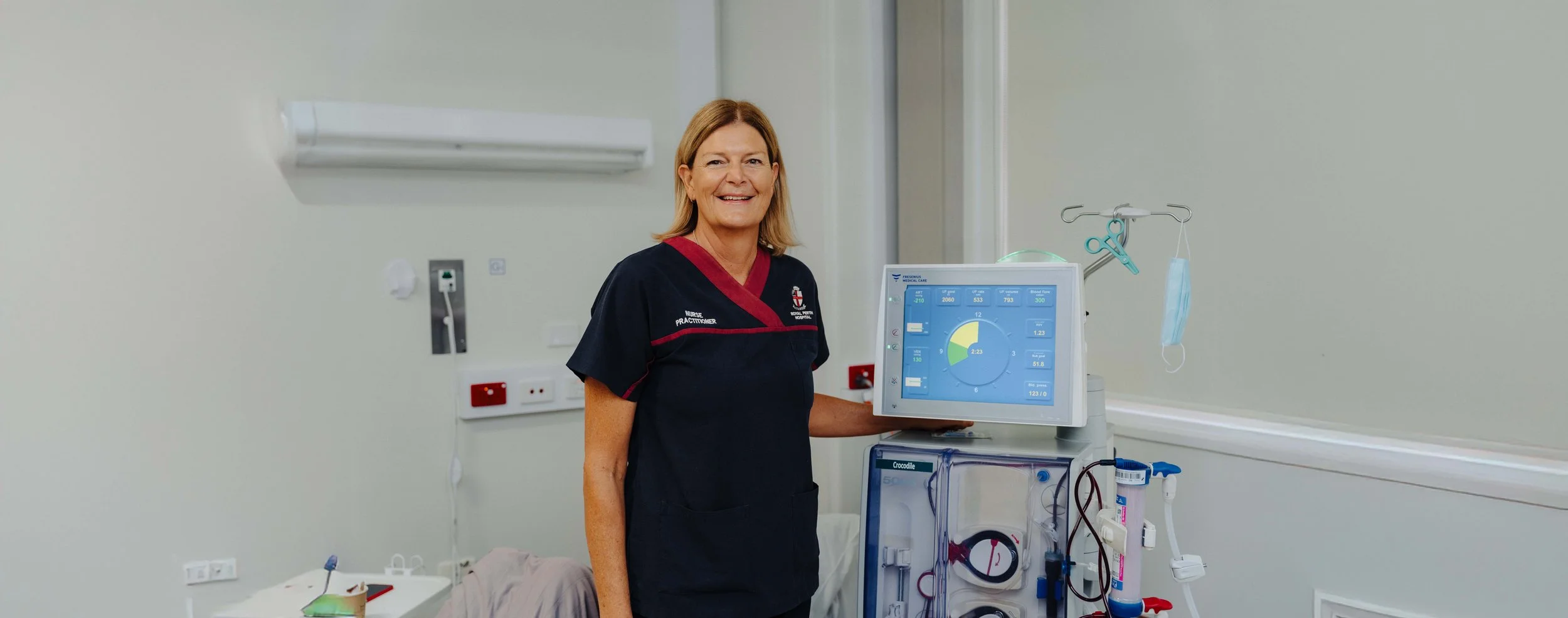
Exploring the experiences of Haemodialysis patients with Arteriovenous Fistulas and Grafts in hospital settings

Exploring the experiences of Haemodialysis patients with Arteriovenous Fistulas and Grafts in hospital settings
Exploring the experiences of Haemodialysis patients with Arteriovenous Fistulas and Grafts in hospital settings
Royal Perth Bentley Group
Funding: $14,936
Coordinating Principal Investigator: Monique Sandford
Co-Investigators: Mrs Juanita Starmer , A/Professor Vicki Patton, Mr Carl Yulie
Haemodialysis is a life-saving treatment for people with kidney failure, but it requires a reliable way to access the bloodstream — typically through an arteriovenous fistula (AVF) or graft (AVG) — however, the management of these vascular sites can cause pain, infection, and emotional distress which can significantly impact a patient’s quality of life.
A new study funded by the RPH Research Foundation and led by Nephrology Nurse Practitioner Monique Sandford aims to change that. Using a mixed-methods approach, the project will gather patient perspectives through surveys and interviews to better understand their concerns, challenges, and emotional responses.
This research addresses gaps in vascular access care for haemodialysis patients, particularly in non-specialist settings such as general hospital wards and emergency departments. It will deliver valuable, actionable insights that will enhance both individual patient experiences and broader healthcare system performance. Findings should translate into tangible changes in policy and practice, ensuring that haemodialysis patients receive the safe, competent and compassionate care they deserve.
The study aligns with East Metropolitan Health Service (EMHS) priorities by focussing on patient safety, quality of care, and patient-centred service improvements. Beyond EMHS, the findings will contribute to state-wide and national efforts to improve haemodialysis patient care, with outcomes expected to be disseminated through peer-reviewed publications, conference presentations, and policy briefs to help hospitals across Australia implement similar best-practice approaches.
This is research with tangible impact — improving training, informing hospital practice, and most importantly, strengthening the healthcare experience for some of our most vulnerable patients.
Exploring the experiences of Haemodialysis patients with Arteriovenous Fistulas and Grafts in hospital settings
Royal Perth Bentley Group
Funding: $14,936
Coordinating Principal Investigator: Monique Sandford
Co-Investigators: Mrs Juanita Starmer , A/Professor Vicki Patton, Mr Carl Yulie
Haemodialysis is a life-saving treatment for people with kidney failure, but it requires a reliable way to access the bloodstream — typically through an arteriovenous fistula (AVF) or graft (AVG) — however, the management of these vascular sites can cause pain, infection, and emotional distress which can significantly impact a patient’s quality of life.
A new study funded by the RPH Research Foundation and led by Nephrology Nurse Practitioner Monique Sandford aims to change that. Using a mixed-methods approach, the project will gather patient perspectives through surveys and interviews to better understand their concerns, challenges, and emotional responses.
This research addresses gaps in vascular access care for haemodialysis patients, particularly in non-specialist settings such as general hospital wards and emergency departments. It will deliver valuable, actionable insights that will enhance both individual patient experiences and broader healthcare system performance. Findings should translate into tangible changes in policy and practice, ensuring that haemodialysis patients receive the safe, competent and compassionate care they deserve.
The study aligns with East Metropolitan Health Service (EMHS) priorities by focussing on patient safety, quality of care, and patient-centred service improvements. Beyond EMHS, the findings will contribute to state-wide and national efforts to improve haemodialysis patient care, with outcomes expected to be disseminated through peer-reviewed publications, conference presentations, and policy briefs to help hospitals across Australia implement similar best-practice approaches.
This is research with tangible impact — improving training, informing hospital practice, and most importantly, strengthening the healthcare experience for some of our most vulnerable patients.
